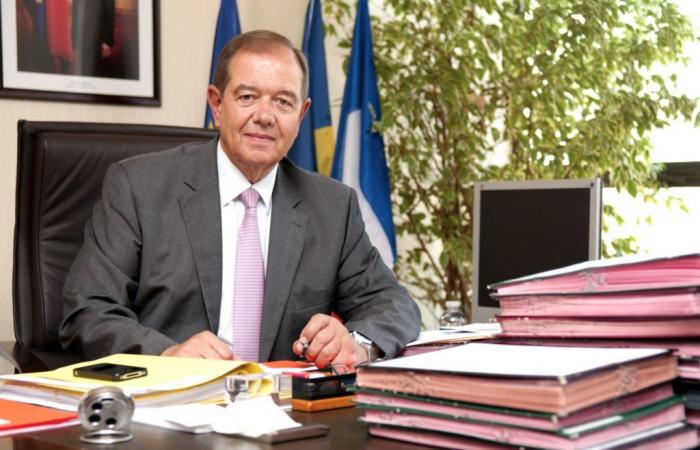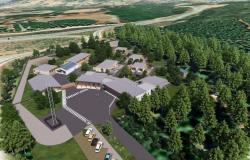Born in Périgueux in Dordogne on December 17, 1944, he joined General de Gaulle at the age of 16 to defend the ideas and the social project that he embodied, through the new Republic that he proposed to the French: the new institutions of the Fifth Republic, national independence, the idea of participation, the right of peoples to self-determination, the Europe of Nations…
From 1962, at the Aix-en-Provence high school, Patrick Ollier took a close interest in political life and the delicate problem of the end of the war in Algeria and its consequences in France.
He became an active Gaullist activist in high school and then university circles, helping with a few friends to found two young Gaullist movements:
- Gaullist Student Action, in 1962;
- The Union of Youth for Progress (UJP), national movement of young Gaullists, in 1965.
At the end of the sixties, Patrick Ollier became an economics teacher at the high school and at the Institute of Political Studies in Aix-en-Provence.
1969-1977: Project manager in ministerial offices
He subsequently left Aix-en-Provence to join the cabinet of Jacques Baumel, at the request of Jacques Chaban-Delmas, then Prime Minister.
In 1969, he became a project manager in the office of Jacques Baumel, Secretary of State for Communication.
He was called by Jacques Chaban-Delmas in 1970 and then by Pierre Messmer in 1973, Prime Ministers, who successively integrated him into their offices as a mission officer for Parliamentary Affairs. Subsequently, Patrick Ollier continued his career until 1981 in ministerial offices.
In 1973, he became technical advisor to Georges Gorse, Minister of Labor. A year later, after the presidential elections, he was appointed technical advisor to Paul Dijoud, Secretary of State for Regional Planning in the new government.
In 1976, Jacques Baumel wanted Patrick Ollier to move to Rueil-Malmaison to prepare for his entry into the municipal team in order to continue their collaboration locally. The same year, he moved there with his family, in the Martinets district.
1977: Involvement in local politics in Rueil-Malmaison
In 1977, he became deputy mayor of Rueil-Malmaison, delegate for youth, sports and leisure. Then, the following year, he was elected as deputy for Jacques Baumel, deputy for Hauts-de-Seine (Rueil-Saint-Cloud-Garches constituency).
He was appointed technical advisor to Alain Peyrefitte, Keeper of the Seals, Minister of Justice, and in particular followed the preparation of the law of February 2, 1981 strengthening security and protecting the freedom of individuals, promulgated at the end of the seven-year term of Valéry Giscard d’Estaing.
Re-elected as substitute for Jacques Baumel in 1981, Patrick Ollier continued his work as deputy for youth, sports and leisure in Rueil-Malmaison, following the municipal elections of 1983.
1982-1988: new responsibilities within the RPR
After the election of François Mitterrand to the Elysée, Patrick Ollier left Alain Peyrefitte’s cabinet. He was appointed director of telematics marketing at the Ministry of Communication. A few months later, he was forced to leave his post, replaced by a person designated by the new majority.
He then decided to leave the administration and entered the private sector by joining the Béghin-Say sugar group, where he became a collaborator of Jean-Marc Vernes, CEO of the group and President of the Vernes bank. He is advisor to the President in charge of communication and human resources.
At the same time, he acquired new responsibilities within the Rally for the Republic (RPR). In 1982, he was secretary of the Rueil-Saint-Cloud-Garches constituency and a member of the Hauts-de-Seine executive committee under Charles Pasqua, departmental secretary of the RPR.
He joined the RPR national team in 1986 and became a national delegate to the general secretaries Jacques Toubon and then Bernard Pons. He was also a member of the RPR National Council. Two years later, he was the RPR national secretary in charge of parliamentary groups.
1988: Member of Parliament and Mayor of Hautes-Alpes
After the 1986 legislative elections, Jacques Chaban-Delmas, elected President of the National Assembly, asked Patrick Ollier to resume his functions with him. He then left Béghin-Say and became his political advisor. He teamed up with André Rossinot, Minister of Relations with Parliament, to organize the new majority in the National Assembly.
In 1988, as part of the preparation for the new legislative elections, following the dissolution of the National Assembly by President François Mitterrand, Patrick Ollier was asked by Jacques Chirac and the national leaders of the RPR to be a candidate in the Hautes-Alpes. Thus, Patrick Ollier, having been a collaborator of Paul Dijoud, former deputy mayor of Briançon for four years, ran against the deputy mayor in office, Robert de Caumont (PS).
The legislative elections of June 1988 were a failure for the right. Only Patrick Ollier wins against a left-wing incumbent. He became deputy for Hautes-Alpes then mayor of La Salle-les-Alpes-Serre-Chevalier in 1989 and general councilor in 1992. He was reappointed until 2001, the date of his return to Rueil-Malmaison.
In 1990, when Jacques Chirac appointed him deputy secretary general of the RPR in charge of animation with Alain Juppé, he simultaneously developed the economic sector of the Serre-Chevalier valley and its resort. He thus took it from 15th to 5th place among French ski resorts in 12 years. He was also elected in 1990, President of the mixed economy company of the Serre-Chevalier ski lifts which employs 400 people.
Patrick Ollier’s interest in protecting the environment and classified sites led him to be elected three times, in 1992, 1996 and 1998, to the presidency of the Ecrins National Park, the largest national park in Europe. This position allowed him to work in close collaboration with Corinne Lepage, then Minister of the Environment, and to prepare the creation of the Conference of Presidents of French National Parks which he chaired from 1992 until the end of his mandates in the Hautes- Alps.
In 1996, he founded and chaired the community of communes of Briançonnais which brings together 11 communes and thus brings together 20,000 inhabitants.
1991-1998: strong involvement in the National Assembly
From 1991, Patrick Ollier became involved in important issues in the National Assembly. He was a member of a commission of inquiry into beef and then a year later was vice-president of a commission of inquiry into the fight against the mafia.
In 1993, he was appointed judge of the High Court of Justice and the Court of Justice of the Republic for the duration of his term. In the same year, he was also elected vice-president of the Commission on Production and Trade (formerly the Commission on Economic, Environmental and Territorial Affairs).
He was appointed rapporteur of the orientation law for regional planning and development, known as the Pasqua law, in 1994.
In 1996 Patrick Ollier was a member of the commission of inquiry on Corsica and of the National Tourism Council until 1999. He was elected in 1998 president of the permanent commission of the National Mountain Council and vice-president of the Assembly National.
In addition, he still exercises important responsibilities in the Gaullist movement, notably being general delegate of the RPR in charge of regional planning to Nicolas Sarkozy. He was appointed political advisor in charge of the life of the movement in 1999 to the president of the RPR, Michèle Alliot-Marie.
2000: Return to Hauts-de-Seine and Rueil-Malmaison
The problem of preparing for the 2001 municipal elections arose in 2000 within the municipal majority of Rueil-Malmaison. Indeed, Jacques Baumel, who wanted to run one last time, suggested that the municipal team choose the man who would be presented to the people of Rueil to succeed him during his term.
During these discussions on the future, the leaders of the different components (RPR, UDF, DL, RPF) refused the applications that came forward within the RPR, including in particular that of Thierry Saussez. They decide to ask Patrick Ollier to rejoin the municipal team to prepare the succession of Jacques Baumel. This proposal could only really be realized with the agreement of the Rueilloises who validated it during the elections with transparency and clarity.
In 2001, Patrick Ollier was elected and became special assistant delegated to the general policy of the City and to finances. The following year, he was elected deputy of the 7th constituency of Hauts-de-Seine (Rueil-Malmaison, Garches and Saint-Cloud) in the legislative elections of June 16, 2002. His substitute is senator Jacques Gautier, mayor of Garches, vice-president of the general council and former substitute of Jacques Baumel.
On June 27, 2002, Patrick Ollier became president of the parliamentary committee on Production and Trade and immediately initiated procedures to change its name. Indeed, the name of this commission which dated from 1959 was no longer adapted to its particularly broad scope of competence. It then becomes the Economic Affairs, Environment and Territorial Committee of the National Assembly. He will chair it for 10 years.
2004: mayor of Rueil-Malmaison
Patrick Ollier was elected mayor of Rueil-Malmaison with 43 votes out of 47 voters at the end of the municipal council meeting of June 18. A vote of unity in which he received the votes of the opposition group “Rueil à venir” which joined the municipal majority.
On March 7, 2007, Patrick Ollier was elected president of the National Assembly with 248 votes out of 267 voters, following the appointment of Jean-Louis Debré as president of the Constitutional Council. A position he held until June 19 of the same year.
On June 17, 2007, he was re-elected deputy for the 7th constituency of Hauts-de-Seine in the first round with 60.29% of the votes. He chose Éric Berdoati, mayor of Saint-Cloud as his new deputy when Jacques Gautier entered the Senate in May 2007. At the same time, he was re-elected president of the Committee on Economic Affairs, the Environment and Regional Planning of the National Assembly unanimously by 146 members.
On March 9, 2008, Patrick Ollier was re-elected mayor of Rueil-Malmaison in the first round with 59.80% of the votes.
He was appointed political advisor to the UMP (ex-RPR) in 2009.
2010: Minister, re-election in Rueil-Malmaison and President of the Greater Paris Metropolis
In 2010, Patrick Ollier became Minister to the Prime Minister responsible for relations with Parliament during the ministerial reshuffle of 14 November 2010. He held this position until 15 May 2012.
On June 17, 2012, he was re-elected deputy for the 7th constituency of Hauts-de-Seine following the 2nd round of the legislative elections. He was also elected vice-president of the Paris Métropole joint union on December 17 of the same year.
In 2013, he was appointed vice-president of the UMP for Movements.
He led the “Rueil en confiance” list during the 2014 municipal elections in Rueil-Malmaison. He came out on top with 56.57% of the votes in the first round. He was re-elected Mayor by the new municipal council on March 28, 2014.
On January 23, 2015, Patrick Ollier was elected president of the Mont-Valérien Urban Community (CAMV), which includes the cities of Rueil-Malmaison, Nanterre and Suresnes, until 2016, when the Paris Ouest La Défense (POLD) territorial public establishment was created.
On January 22, 2016, he was elected President of the Greater Paris Metropolis.
2020: re-election in Rueil-Malmaison and the Greater Paris Metropolis
He leads the “Together for Rueil” list during the 2020 municipal elections in Rueil-Malmaison. He came first with 50.11% of the votes in the second round. He was re-elected Mayor by the new municipal council on July 3, 2020.
On July 9, 2020, he was re-elected President of the Greater Paris Metropolis.
On September 28, 2021, he was elected president of the Union Committee of the Seine Grands Lacs territorial public basin establishment (EPTB).






